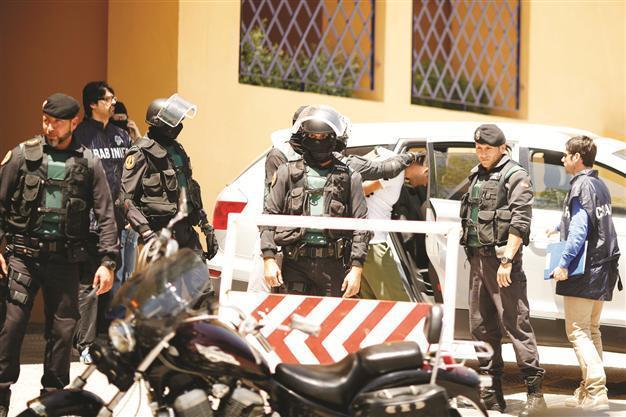No one innocent in human trafficking, UN official says
ISTANBUL - Hürriyet Daily News

A man is escorted by Spanish and Italian security forces to an unmarked police car after being arrested in a flat. REUTERS Photo
Almost every country in the world is complicit in human trafficking, as each one is an origin, transit or destination country for the trade, the executive director of the United Nations Office on Drugs and Crime (UNODC), Yury Fedotov, has said, adding that the victims of the crime are being exploited in almost every part of the world.“We are often talking about vulnerable people tricked and coerced into being trafficked and then cruelly exploited. Almost every country in the world is an origin, transit or destination country for human trafficking,” Fedotov told the Hürriyet Daily News in a telephone interview.
He noted that human trafficking was a global crime producing estimated yearly profits of around $32 billion dollars, each one of those criminal dollars is earned from the misery and suffering of victims. According to the UNODC’s Global Report on Trafficking in Persons 2012, women account for around 60 percent of all trafficking victims detected globally by the authorities. “Our report found victims from 136 different nationalities in 118 countries. We also identified at least 460 different trafficking flows for the victims globally,” Fedotov added.
“Based on the findings of our report, however, I can say there are significant regional variations. The share of detected child victims, for example, is 68 percent in Africa and the Middle East, and 39 percent in South Asia, East Asia and the Pacific; that proportion diminishes to 27 percent in the Americas and 16 percent in Europe and Central Asia,” he said.
Fedotov underlined that many countries may had difficulties in confronting human trafficking. “They may, for instance, lack the law enforcement capacity or need additional support in the area of criminal justice,” he said. Noting that helping to build capacities and offering technical support to these countries was part of U.N.’s work, he said that they could not afford to exclude countries. If countries are excluded the system was at risk of a two-speed approach in which “human trafficking declines in some countries, and possibly grows in those countries that are blacklisted and possibly ignored. If we did this, we would be offering the traffickers the potential to simply cross borders to evade punishment.”
‘Turkey a transit route’
However, Fedotov heralded some good news, as the number of countries criminalizing human trafficking increased from 78 to 95 percent of the total considered in the report between 2008 and 2012. “The improvements are encouraging, but they are coming too slowly to help the millions of victims. A catalyst is needed. We need an inspirational, but totally realistic goal: a decade of concrete action to try to end human trafficking. Action built on cooperation and coordination,” he said.
There is a roadmap for the international community. A global plan of action was agreed in 2010 and the UNODC is working with its partners and the international community to implement this plan throughout the world.
When the executive-director was asked how they label Turkey on the issue, Fedotov said Turkey is a transit route for human trafficking along the so-called Mediterranean route for trafficking, but it is also a destination for victims.
“I should also point out that the Turkish government has vigorously sought to prosecute traffickers and has introduced legislation that outlaws this crime,” he said.
“Although it concerned migrant smuggling and not human trafficking, I would like to commend Turkey on its work earlier this year, in early February, when the Istanbul police force worked with law enforcement agencies from other countries to break up an international migrant smuggling operation.
It was a very good example of how international cooperation and information sharing supports local police work.”
















